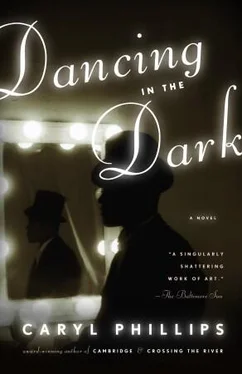An organization to be known as the “Frogs” was formed Sunday evening at the residence of George W. Walker,107 West 132nd Street. The prime movers in forming such an organization are the leading actors of the race, and it is the intention of the incorporators to make the “Frogs” to the Negro performer, as well as to the members of the race, what the Lambs’ Club and the Players’ Club mean to the white profession…. The Frogs have been formed for social, historical and library purposes with a view to promoting social intercourse between the representative members of the Negro theatrical profession and to those connected directly or indirectly with art, literature, music, scientific and liberal professions and the patrons of arts.
NEW YORK AGE
He sits in Bert’s library and looks at his friend and wonders if Bert even remembers those nights in the mountains of Colorado. They had dreams back then, and they were determined and talked often of the future, but these days Bert never speculates about the future. In fact, these days Bert seems reluctant to talk on any subject, and he hardly ever mentions Bandana Land . Bert appears to have effectively passed business responsibility to George, for he does not seem in the slightest bit interested in either Williams and Walker or the Frogs, and for some time now George has felt that they ought to talk frankly but he knows that Bert is uncomfortable sharing his feelings. George understands that the situation with his father must be making life even more difficult for his partner, for people are talking, and the more people talk, the less poor Bert seems to want to open up. Of late, Bert seldom leaves his home unless he is going to the theater, or unless he is visiting Metheney’s, but George suspects that, in his mind, Bert travels.
I used to go over [to Europe] every summer and study pantomime from Pietro, the great pantomimist. He is the one artist from whom I can truthfully say that I learned. He taught me gesture, facial expression — without which I would not have been able to do the poker game stunt that was so popular…. I played a good deal of pantomime in Europe. I did the Toreador in the pantomime version of Carmen and many other parts.
BERT WILLIAMS
But George knows that Bert travels only in his mind.
The poker game was the most famous stage act that Mr. Williams ever performed, and I had read that he included it for the first time in Bandana Land where he played the part of Skunton Bowser, who takes up the deck of cards while heavily under the influence of applejack. I wanted to ask Mr. Williams about the origins of the act, for he claimed to have discovered his technique for the routine while studying with “Pietro” in Europe. However, although I read everything that I could find, I found it impossible to discover anything about this Mr. Pietro. Even more puzzling was the fact that nobody I questioned had any memory of Mr. Williams ever doing any studying in Europe. When I found myself privileged to be sitting opposite Mr. Williams I had second thoughts about raising this puzzling quandary. Instead, I asked him about the big hit song of the show, “Late Hours,” which he sung while performing the famous poker game routine. Mr. Williams was happy to talk to me about the song.
The hard-drinking man gratefully accepted another whiskey from George and then settled back to tell his late-night tale. “You see,” he began, “I hear Mr. Bert got the idea while the two of you were playing in Lincoln, Nebraska, some time back. Seems like he went to see an old friend in the hospital and the guard said to him, ‘Would you like to walk around with me and see the place?’ Mr. Bert accepted the invitation and the guard first took him to see the patients that were almost ready to leave the hospital. Then the guard took him to another part of the hospital where the patients were very ill. Apparently there was one fellow in a room alone. Evidently, his mental illness was due to gambling, playing poker. In his room was a table and a chair, and the fellow was in there all alone, talking to himself and acting as though he were in a poker game, for he would go through the motions of having a drink, looking around the table, and smiling at the other players. He would reach in his imaginary pile of chips and throw in his ante, looking around to see if everybody was in, then smile again. He would shuffle and begin to deal around and after he had finished dealing, he would pick up his imaginary hand and look at each player after they had discarded, to see how many cards they wanted. All this time he would have a smile on his face as if he believed he had the best hand, and as each player asked for cards, his smile would get broader, and he would put up fingers to show he understood how many. Then, when one of the imaginary players stood pat, his smile would begin to vanish. When the deal was all over, the betting would start. Each player would call or pass. When it was up to him, he would look at his hand, put it down, pour a little drink from his imaginary bottle, and look again. Then he would push in the last of his chips and call. After the showdown, he had the second-best hand. He would stand up, brush off his pants, and go back to his bunk, place his elbows on his knees, and, leaning on his hands, shake his head slowly. I reckon that it’s from this fellow that your Mr. Bert learned that particular routine. I believe he picked up plenty by just watching ordinary folks. That’s all. Just watching ordinary folks, then adding his own feel to it.” George smiled and signaled to the barman to bring another whiskey.
Fred Williams opens his eyes and sees his American daughter-in-law standing before him with a glass of juice and a plate of toasted bread. The items are balanced on a tray that she cradles in her arms. She holds it like an offering, and he stares at her. No more barbering. She has made it clear that it is fine for him to stay in the house until he regains some peace in his mind, or until his wife returns from California, whichever occurs first, but his daughter-in-law is adamant that there must be no more cutting. He looks at her and realizes that his boy has found himself a good woman, and then he closes his eyes and pretends that she isn’t there, but he listens. He hears her put the tray down on the bed-side table. For a moment she stands over him and he worries that she might say something, but she remains silent. He is grateful that his daughter-in-law does not lean over and try to touch him and gain his attention. He keeps his eyes firmly closed and listens as she leaves the room.
A heart heavy like a stone, for he now understands that bringing his son to America was an act of foolishness that has allowed the powerful nation in the north to come between them. The country has made a nigger of the boy and there is nothing that he can do to fight this United States of America, which he now understands habitually snatches children from the arms of those who gave them life and encourages them to become people who their parents no longer recognize, but people who their parents cannot stop loving even though they despise the transformation and resent the loss. A heart heavy like a stone, his handsome West Indian son a stage nigger in America, the boy’s own heart leaden with guilt, his mouth stopped up, his words trapped in his head, unable to reach out to father or wife, deaf to everything but the roar of the white audience.
Tonight we go at each other as though we are animals tearing each other apart. She tries to devour me and I fight her off at the same time as I too try to devour her. Pushing at her, pulling back, and then pulling her on. The orchestra is warming up, playing runs, the blare of the trumpet, the gun rattle of the drums, and there is plenty of noise out there, enough to mask what is going on in dressing room number two with the chair thrust up against the door and the drapes pulled tight. I turn Eva to the side and push her down onto the floor. She tries to get up and I slap her and she cries out so I force my arm into her mouth and she bites the sleeve of my velvet jacket. Bitch. I spit the word at her and she growls at me. Bitch, I say again and a paw reaches out and slashes at my face and as I turn away a single nail catches me and instinctively my hand goes up. She’s laughing now, and she tries to wrestle me off but I go at her and tear at her dress until it rips. I pull out first one breast and then the other, and then I see the fear in her eyes. Bitch. Cut me? Cut George Walker? I press Eva to the floor as though I’m trying to drive her into the basement of the theater. Down on her, pushing down on her until she stops struggling, and the sweat pops onto her brow, each bead independent, and she is defeated. The stage manager knocks at the door and I hear his raised voice. Mr. Walker. He knocks again. Okay, I’ll be there. The sleeve of my jacket is ripped, gashed purple, and I stand up but Eva cannot move. I know that she is wounded, and I can see that her dress is torn and that she is in disarray, but I abandon her and look in the mirror. There is blood on my cheek. Mr. Walker, your call. I wipe the blood with my damaged sleeve and try to rearrange myself. Mr. Walker. She looks at me, her chest heaving with exhaustion, her eyes still hungry. I’ll wait, she says. I’ll be here. Mr. Walker, please, Mr. Williams is in the wings. I look at her and realize that I don’t have the energy to argue.
Читать дальше












